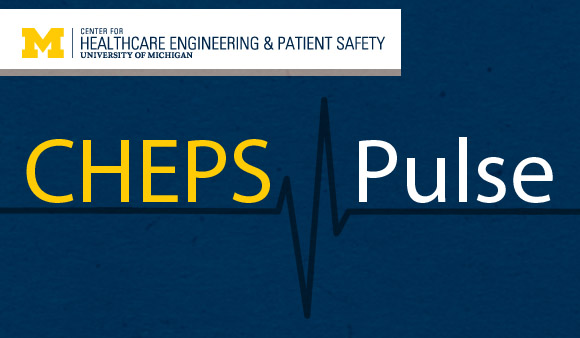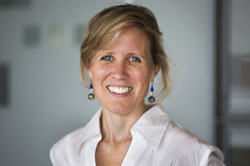In This Issue
Message From Amy Cohn, CHEPS Associate Director
Student Spotlight: Donald Richardson
Practitioner Spotlight: Sameer Saini
Symposium on Healthcare Engineering & Patient Safety
Recent News
Upcoming Events
Where In The World Is CHEPS?
Message From Amy Cohn, CHEPS Associate Director
Hello, Everyone!
As I sit down to write this, I’ve just had the chance to look through all of the fabulous photos from our annual symposium last month. I was reminded of what a great weekend it was. From the Friday night reunion at Conor O’Neill’s to the tailgate and football game on Saturday with CHEPS benefactress Merrill Bonder to the networking alumni panel on Monday to The Big Event itself, complete with posters, live music, great food, and lots of lively conversation, it was a whirlwind of activity!
One of the things we did at the symposium was to ask people for a single word to capture the essence of CHEPS for them. A word I heard several times, and the word I myself would choose, was “community.” CHEPS brings together students, faculty, clinicians, practitioners, patients and their families, and more from across many different disciplines and backgrounds to solve important real-world problems in the healthcare industry. Clearly this multi-disciplinary approach is working, but it goes well beyond that, as the CHEPS network grows and we not only work together but support each other in countless different ways.
I’ve seen senior students help more junior students with their problem sets, recent alums help graduating students with their job searches, visiting summer students be embraced and welcomed into the social culture, and high school and middle school students from the community come to learn and get excited about future career opportunities that they hadn’t even known existed. We’ve had Halloween parties and holiday celebrations, shared food from our respective countries and cultures, and even witnessed our first CHEPS wedding! The fact that Deans Woolliscroft and Munson took the time to attend the symposium even after having retired from their positions as dean, and the appearance of Vice Provost Holloway and IHPI Director John Ayanian, are a testament to the tremendous support that we receive from across the entire university.
I hope you too have felt this sense of community, that you can think of times when you have been helped by members of CHEPS and times when you have been the one lending a hand. And if you have ideas as to how to make CHEPS an even stronger, more welcoming, and more supportive community, I hope you’ll share them with us. I can’t wait to see what the next year will bring us and look forward to celebrating it with you at next year’s symposium.
Go CHEPS and GO BLUE!
Amy
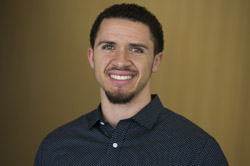 Student Spotlight: Donald Richardson
Student Spotlight: Donald Richardson
Donald Richardson first began working with the Center for Healthcare Engineering and Patient Safety (CHEPS) in 2013 as a Summer Research Opportunity (SROP) student. He returned to the University of Michigan, and the CHEPS team, in 2014 when he began his PhD program in Industrial and Operations Engineering. Through his time at CHEPS, Donald has been a vital and contributing member on many projects – starting with the Asthma and Transplant projects during his time as a SROP student, and continuing with the Chemotherapy project after beginning his PhD program.
Currently, Donald’s main focus is on the Chemotherapy (Chemo) project: a collaboration with the University of Michigan Comprehensive Cancer Center to improve patient experience throughout the Cancer Center process. While the overall scope of this project includes work with multiple process (phlebotomy, clinic, pharmacy, infusion), Donald’s work is particularly focused on the pharmacy department, where he has been the developer and driver of the PreMix project.
Donald describes PreMix as a project “looking at ways to improve chemotherapy drug mixing policies to decrease patient waiting times.” He further elaborates that he is working on “the development of an app that can aid pharmacists in deciding which drugs to mix before patients arrive based on factors such as cost, patient chance of treatment deferral, and drug mixing time.” This approach has been received with great interest and Donald has had major success in developing his idea from conception to optimization model and now to a user friendly app. While Donald says the process has taken “many observations and meetings with pharmacists, nurses, physicians, and other healthcare professionals” he remarks that “it is exciting to take part in the transformation of a once minor idea, into a full time project with promising outcomes.”
Donald commented that his work with healthcare professionals has been influential in altering the way he thinks about healthcare problems overall. While he hopes to implement his work in the near future, he says that one of “the biggest surprises [about working in the healthcare industry] would be the timeline between a model completion to implementation.” He explains that “communication between all affected units is key before proposing any pilot for a project.”
When asked about his time at CHEPS, Donald said “on top of the remarkable students I have met, I really appreciate the community.” He stated that “CHEPS hosts some of the most diverse teams in terms of both academic and cultural backgrounds,” and that incorporating these various perspectives creates unique environments for maximizing performance.
With such a successful tenure at CHEPS, it is no surprise that Donald has indicated that his “experience with healthcare consulting at CHEPS has influenced [him] to pursue a consulting career after graduation.” However, with a few more years before the completion of his program, fellow students and collaborators alike are pleased to know that they can continue to have the opportunity to work with Donald and benefit from his amazing contributions and strong leadership.
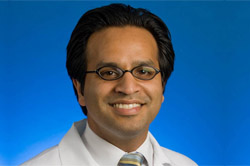 Practitioner Spotlight: Dr. Sameer Saini
Practitioner Spotlight: Dr. Sameer Saini
Dr. Sameer Saini is a physician at the Veteran’s Affairs Hospital and Assistant Professor of Gastroenterology at the University of Michigan Medical School. He graduated from the Alpert School of Medicine at Brown University in 2001 and finished his residency in Internal Medicine at the University of Michigan in 2005. Upon finishing his residency and fellowship, Dr. Saini joined the University of Michigan Medical School faculty in 2008. Dr. Saini focuses his research efforts on improving the efficiency and value of colon cancer screening.
Currently, a lot of over screening practices exist. Given limited resources in the context of many healthcare systems, there is an increasing desire to make sure that CRC screening is done in an efficient manner. Dr. Saini’s recent efforts have been focused on developing both system-level and patient-level interventions to enhance the appropriate use of CRC. From a systems-level intervention perspective, he is working to develop and implement clinically sensitive performance measures to enhance appropriate use of CRC screening. As far as measuring the success of these performance and quality indicators, he said, “The measurement of success can be relative, but in my mind, I measure success when I can see an alignment between utilization and benefit of services.”
In terms of patient level interventions, Dr. Saini is looking at new ways to engage patients in their own care. He is also focused on developing individualized approaches to cancer screening, including the development of patient-centered quality measures. According to Dr. Saini, “There has been a proliferation of measures in the domain of CRC screening, but they focus too much on the technical aspect of colonoscopy. This leaves a lot of room for us to improve on the patient side of care.” In a recent publication in the Journal of Clinical Gastroenterology and Hepatology, Dr. Saini and his colleagues proposed a number metrics to measure non-colonoscopy qualities of CRC screening.
Dr. Saini also echoed the need to utilize limited screening resources as effectively as possible. Dr. Saini is working with a team at the Center for Healthcare Engineering and Patient Safety (CHEPS) in order to improve endoscopy scheduling practices and therefore improve resource utilization. The team at the CHEPS is currently developing tools to assess the impact and efficacy of current scheduling practices in the University of Michigan Health System.
Outside of medicine, Dr. Saini describes himself as a true audiophile. As an undergraduate, he studied psychoacoustics, or the study psychological effects of sound perception. He designed sound rooms to engage listeners in an optimal listening environment. But his love for sound goes beyond just designing sound rooms. He frequently plays the ukulele for his kids and is a former director of his collegiate a cappella group as well. We look forward to continuing our collaboration with Dr. Saini.
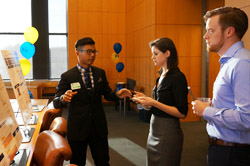 Symposium on Healthcare Engineering & Patient Safety
Symposium on Healthcare Engineering & Patient Safety
“The CHEPS Symposium never ceases to amaze me. It really is a manifestation of exactly what CHEPS is all about: collaboration,” said Anna Munaco, Industrial and Operations Engineering Undergraduate.
On September 26th, 2016 CHEPS hosted its Fourth Annual Symposium on Healthcare Engineering & Patient Safety. Over 30 posters were on display representing a variety of research and projects from inside and outside of the university. Approximately 150 attendees came from throughout the university, representing Engineering, the School of Public Health, the Health System, the Medical School, the School of Nursing, and the Institute for Healthcare Policy and Innovation. Several, like returning alumni and local corporate representatives, also attended from outside the university.
“There are more alumni coming back to this event as the CHEPS alumni network grows,” said Bill Zhang, HEPS master’s student. “Meanwhile, I was able to communicate with other members of U of M community beyond CHEPS at the symposium. That’s why CHEPS symposiums have been such great events: bringing different brilliant minds together while focusing on advancement of projects related to healthcare.”
For the first time this year, alumni didn’t just attend the symposium and the traditional reunion dinner held the Friday before, several also took the time to hold a panel discussion for current CHEPS students. The panel focused on allowing participants to share their experiences in the healthcare field and answer questions about the industry.
Current students and alumni greatly enjoyed the many opportunities to interact with one another that the symposium and related events provided. Matt Rouhana, an alumnus of the HEPS master’s concentration now working in the Henry Ford Health System, said his favorite part of the symposium was the opportunity to learn “about the projects that the current students are working on and how some of my projects that I was on in the past have done, including both the Chemo project and the Asthma project.”
Unlike the alums who reflected on past projects and symposiums, Andrea McAuliffe, a first year HEPS master’s student, saw the symposium as a chance to immerse herself in CHEPS and look to the future. “As a new HEPS master’s student, it was really inspiring to see all the projects other students have worked on,” she said. “I especially liked learning what everyone’s background was, and how they brought a unique perspective to their work. I’m looking forward to attending and participating in future symposiums!”
Attendees not only had the chance to learn about a wide variety of research projects, they were also able to vote for their favorite poster. First place in the audience choice for best poster competition went to “Patient and Caregiver Engagement in a Health Information Technology Tool in the Context of Hematopoietic Cell Transplantation” by Alex Fauer, Anna Munaco, Roshun Sankaran, Maite Van Hentenryck, Rahael Gupta, Evan Bischoff, Amy Cohn, Lyndsey Runaas, and Sung Won Choi. For second place, attendees selected “A Systematic Analysis of Procedures, Cleanability & Manufacturer Cleaning Instructions of Surgical Instrument Reprocessing” by Bill Zhang, Megan Yanik, Maite Van Hentenryck, Wesley Chen, Roshun Sankaran, Hassan Abbas, William Pozehl, Joe DeRosier, and Jim Bagian.
Bill Zhang, who took second place in the poster competition said, “It was such a great event to connect all the donors, alumni, collaborators, advisers, and students by celebrating another productive year at CHEPS. I was honored to receive the second place in the poster competition, but the biggest reward was the encouraging words from others after I presented my poster to them.”
Anna Munaco agreed that sharing her research with other attendees was one of the highlights. “It was a pleasure to share my work with interested guests from industry, the School of Nursing, the hematopoietic service, the College of Engineering, and many other places. It is a great environment to exchange and learn about new research in the healthcare landscape. I am so glad and honored that I could attend and present a poster this year,” she said.
As the symposium and CHEPS grow, the depth and breadth of the research and collaboration represented each year has also grown. William Pozehl, CHEPS Research Area Specialist and a graduate of the HEPS master’s program, said, “The moment that struck me was, while listening to Amy give remarks, I found myself standing behind a row of the following people: Dave Munson, former Dean of the College of Engineering; James Woolliscroft, former Dean of the Medical School; John Ayanian, Director of the Institute for Healthcare Policy and Innovation; and Sanjay Saint, Chief of Medicine of the Ann Arbor VA Medical Center. That these and other important figures within the University of Michigan’s research community wanted to attend the symposium was incredibly gratifying. Seeing our students share their hard work with them was even more invigorating!”
You can view pictures from the 2016 Symposium on Healthcare Engineering & Patient Safety on our webpage.
Recent News
David Mendez Seminar
Turgay Ayer Seminar
Pooyan Kazemian & Mark Van Oyen Seminar
CHEPS Alumni Panel
Amy Cochran Seminar
Sanjay Saint Seminar
Brandon Pitts Joins CHEPS
David Giancola Lunch & Learn
RCA2 Lecture
Upcoming Events
Providing Better Healthcare through Systems Engineering Seminar Series
Where in the World is CHEPS
HEPS Master’s student Bill Zhang is pictured at the top of the Angel’s Landing trail in Zion National Park in Utah!
See more Where in the World is CHEPS on our webpage.
The CHEPS Newsletter team is: Elizabeth Olin (HEPS master’s program), Pranjal Singh (HEPS master’s program), Elizabeth Fisher (staff)

